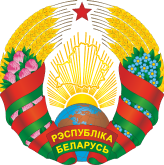Mikhail Drinevsky
Mikhail Pavlovich Drinevsky (February 12, 1941 – November 9, 2020)
“The folk song is our history, our shrine, our roots.
The song should not just sound, the song should breathe.
The song is impossible to retell - the song must be listened to!
After all, good music makes a person purer and nobler! -
(M.P. Drinevsky).
People's Artist of Belarus, laureate of the State Prize of Belarus, laureate of the President's Prize "For Spiritual Revival", honorary academician of the International Personnel Academy, outstanding musician, folklorist, ethnographer, great connoisseur of folk music, professor.
For his great work in the preparation and holding of the XXII Olympic Games, he was awarded the medal "For Labor Valor", the Orders of the Red Banner of Labor and Francysk Skaryna. The name of M.P. Drinevsky was given to the Lelchitsy School of Arts in the artist’s small homeland.
For a long time, Mikhail Pavlovich was the chairman of the board of the Belarusian Union of Musical Figures, worked at the Department of Choral Conducting of the Belarusian State Academy of Music, maintained fruitful creative relations with Belarusian composers and poets, was chairman and jury member of many competitions and festivals. He made a great contribution to the development of national culture, with his bright talent and many years of fruitful work he earned the respect of his colleagues and public recognition, so the name of Mikhail Pavlovich Drinevsky became a symbol of an entire era in choral art.
Mikhail Pavlovich Drinevsky was born on February 12, 1941 in the village of Tonezh, Turovsky (now Lelchitsky) district, Gomel region. Having by nature musical abilities, Mikhail Drinevsky at the age of 13 began to work as the head of the choir of the Trud collective farm in the village of Tonezh. In 1959 he entered the Gomel Musical College. During his studies, he worked with the folk choir of the village of Pribytki in the Gomel region and with the children's choir of the Palace of Pioneers in Gomel. In 1963, M.P. Drinevsky entered the Belarusian State Conservatory named after A.V. Lunacharsky, after which he was sent to work at the Minsk Musical College. Since 1973 - chief choirmaster, and since 1975 - artistic director of the State Choir of the BSSR (now the National Academic Folk Choir of the Republic of Belarus named after G. Tsitovich). Under the leadership of Mikhail Pavlovich, the National Academic Folk Choir has become a highly professional group that has gained wide popularity in our country and abroad.
Mikhail Pavlovich never worked at half strength. Everyone knew about his hot temperament, felt the great emotional charge of the conductor. Mikhail Pavlovich had a strong-willed character. He combined skill, diligence, patriotism, charm and surprisingly subtle humor.
Mikhail Pavlovich was a man of great, beautiful soul and sincere heart, he always found a moment for each of the artists. With tenderness, respect and warmth, he treated folk art and song. All the warmth of the soul, all his skills, life experience, love he invested in working with the team. He taught the artists of the choir not only to sing songs, but to create complete bright artistic images, to convey the whole gamut of feelings, their beauty and depth. In each work, Mikhail Pavlovich paid great attention to the purity of intonation, drama, and the expression of timbre details.
Rich experience and his own life wisdom, a deep understanding of the spiritual heritage of the people allowed Mikhail Pavlovich to develop and improve the traditions laid down by Gennady Ivanovich Tsitovich for many years. On the basis of seemingly ordinary Belarusian songs, he created real masterpieces that are very popular with listeners and are the golden fund of the group's repertoire.
On the occasion of the 60th anniversary of the birth of M.P. Drinevsky, director V. Orlov made a video film “How I will go the road”, dedicated to the main stages of the master’s work. And in 2021, a musical collection of the same name was released, which contains choral arrangements by Mikhail Drinevsky.


